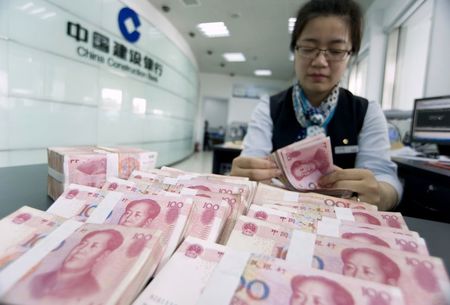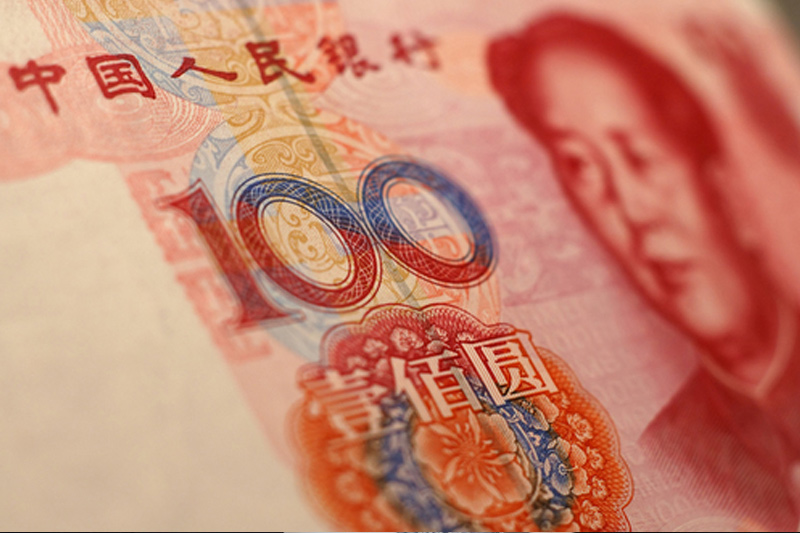By Koh Gui Qing and Saikat Chatterjee
BEIJING/HONG KONG (Reuters) - China's quest to turn its yuan into a full-fledged global currency has hit a road-block as the planned roll-out of a worldwide payments superhighway looks certain to get delayed because of policy snags and technology challenges.
The China International Payments System (CIPS) that would replace a patchwork of networks and allow hassle-free yuan payments was meant to debut later this year, but bankers say it is unlikely to be ready before 2016.
The slippage might be good news for China's big clearing banks such as Bank of China (SS:601988) (HK:3988) and offshore centers such as London or Singapore, which now handle most international yuan transactions and stand to lose their privileged position.
In the long run, however, an efficient global network for yuan trades will be essential for fulfilling Beijing's wish to boost the currency's use. A spate of agreements on yuan clearing with financial centers in Europe and Asia signed over the past month or so highlighted the importance of such a system for those ambitions.
Yet government debate over how much users should be allowed to move in a single day without punching too big of a hole in China's capital controls and technological problems have stymied the system's development, bankers say.
"The central bank is telling others that the first batch of CIPS will be used this year, but we think it is unlikely," said a banker at a large Chinese bank. "The earliest will be 2016."
Bankers also worry that the roll-out won't be glitch free, and a poorly-designed system with a high transaction failure rate could put off investors.
The Chinese central bank, which leads the effort and was contacted for this article, said the building of the CIPS network was making steady progress as planned. It added that it attached "great importance" to the system, whose creation was first announced in 2012.
Eager to have a currency that matches the clout of its rising economy, China has made great strides in promoting the yuan's global use.
It is now the world's seventh most-used currency in goods and services payments, having climbed from 20th rank in 2013, according to data from international financial communications platform SWIFT.
But to attain the dollar's status as the world's reserve currency, China needs to back its yuan with a quality payment system. The dollar is supported by two -- the privately-owned CHIPS system, with an average daily transaction volume of $1.5 trillion and the Federal Reserve's Fedwire handling around $3.5 trillion.
GROWING PAINS
China's record with building its own payment system is less than stellar.
Some banks said they were given only six to eight weeks instead of the customary six months to prepare for an upgrade in the central-bank run China National Advanced Payment System, or CNAPS, causing anguish among its users.
Counter-intuitive coding for processing transactions, ambiguous regulation, heavy demands for information disclosure and the bureaucracy's poor record in software development are not a good omen for the CIPS, some bankers say.
"It is a big enough project and they underestimated the complexity of it," said the head of transaction services at a European bank in Hong Kong who declined to be named due to the sensitivity of the subject.
Troubles caused by failed transactions have made some companies consider reverting to the dollar in trade deals, foreign bankers and corporate treasurers at multinational companies say.
One foreign finance executive, who spoke on condition of anonymity, estimated that a yuan clearing transaction is two-and-a-half times more likely to fail than a dollar deal.
OBSOLETE?
Yet teething problems aside, few bankers doubt the new international network will eventually become a major long-term alternative to clearing banks and offshore centers.
Having used granting foreign cities rights to host Chinese clearing banks as a part of its diplomacy, Beijing is playing down such a scenario in public.
Last week, for instance, China and South Korea leaders agreed in Seoul on steps to create a yuan clearing system as part of efforts to strengthen commercial and diplomatic ties.
Chinese bankers say the central bank is trying to assure them that the planned global network will not dent their renminbi business. In private, however, regulators are blunt.
"There will be no need for clearing banks in the future," said an official with a Chinese regulator who declined to be named as he is not authorized to speak to the media. When asked if offshore yuan clearing centers would also become obsolete once CIPS goes live, he said the new system will provide "alternative channels" for yuan payments.
Robert Minikin, head of Asia foreign exchange strategy at the Standard Chartered Bank in Hong Kong, says granting clearing rights for offshore centers is not so much a commitment from Beijing to preserve their privileged position, but rather a signal of its global ambitions for the yuan.
"It (the global payment system) helps create more of an even playing field for the financial centers outside mainland China."
In the meantime, any loss in clearing fees for banks and offshore centers due to competition from CIPS won't be paltry.
Daily yuan trading volumes have gone up 3-1/2 times since 2010 to $120 billion, the ninth highest, according to a Bank for International Settlements report published last September.
Luxembourg, which signed a deal with China last month that precedes the designation of a yuan clearing bank in the financial hub, is watching the payment network's progress closely.
Its finance minister Pierre Gramegna, who was in Beijing last week to mark the agreement, said he would discuss the network with Chinese authorities and "listen carefully" to what they say about the timing of its launch.

But he is optimistic that not all is lost for CIPS rivals.
"In the end, it's the market that decides," Gramegna said when asked whether clearing banks and centers will soon be irrelevant. "It's the solution that is the most efficient that players would choose."
(Additional reporting by Pete Sweeney in SHANGHAI; Editing by Tomasz Janowski)
